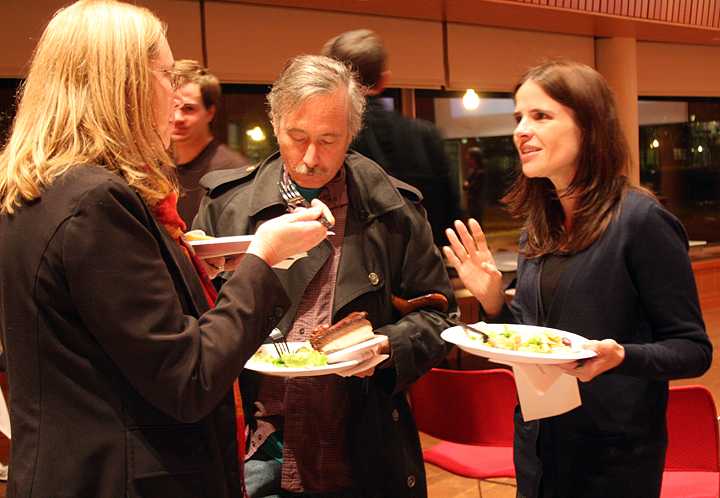This week, Grinnell played host to a three-day line up of events revolving around Iowa’s biggest economic asset. “Corn Belts: Iowa and International Agriculture,” sponsored by the Rosenfield Program, Center for Prairie Studies and Center for International Studies lasted for three days, during which it informed listeners in JRC 101. The week of events began with a brief introduction to Tuesday’s speaker, Kendall Lamkey of the United States Department of Agriculture, by Professor David Harrison, French, who stressed that corn is an integral, though often overlooked, part of our day to day life.

“We wanted to provoke thoughts regarding—how do methods for growing corn in Iowa compare to those around the world, what are the economic and social consequences of the way we grow corn?” Harrison said. “The focus of all the talks is, how can we link the needs of those within our local area, and those around the world.”
The marathon began Tuesday evening with “The Origin, Production and Utilization of Corn,” presented by Lamkey. He discussed the different areas of work his job in the agronomy department at Iowa State University includes. He also stressed that corn is not the only component of Iowa’s agriculture, but that it is also number one in the nation in soybeans, ethanol and pork production. He also presented his ideas regarding the future of Iowa’s agriculture.
“We can solve some of the issues of production by including more perennials,” Lamkey said. “We need to look at the water issues, and we should have more grasslands.”
The events took an international angle on Wednesday afternoon at 4:15, when Daniela Soleri from the University of California Santa Barbara, and Carmen Martinez Novo, author of Who Defines Indigenous?, presented.
Soleri gave a speech called “Views from the Campo: Traditional Maize Agriculture in Oaxaca, and Martinez Novo gave one called “Notes on Subsistence Agriculture and Food Sovereignty in Ecuador.”
Later in the day, Ford Runge, Distinguished McKnight University Professor of Applied Economics at the University of Minnesota, gave a speech titled “Rivers of Gold: Where does corn flow and does it make sense?”
His talk touched on various economic issues regarding how the US government should enhance the corn business.
“Policies are based on regional factors, that’s why senators as ideologically diverse as Grassley and Harkin are locked up in support of subsidizing corn production—it’s because they are from Iowa,” Runge said. Additionally, he claimed that the corn business is mainly a two-country game between Brazil and the US and that the US is striving to gain the upper hand.
On Thursday afternoon James McCann, Professor of History, African Studies Center at Boston University presented on “Corn: Africa’s Story in Four Acts.”
He began with saying, “I grew up surrounded by the crop in my own backyard, and it is rather unique that I came to think of it in the African context.”
He went on to elaborate on the first act, “Naming the Stranger,” where he explained what the first encounter with corn in Africa was like. He discussed how at first there were lots of different types of corn, that there wasn’t one name for it, and that Europeans thought that it was some kind of chickpea.
The second act was “Biodiversity in African Maize-1990,” in which he elaborated on how we have seen an elimination of diversity and everyone began growing exclusively white maize in the 80s.
Act three, titled “Breeding the Modern: SR-52,” brought the discussion to a discovery made in 1958, where Southern Cross was combined with Salisbury White to get a Maize miracle.
Finally, the fourth act was “Unintended Consequences: Maize and Malaria,” where the discussion turned to the fact that maize in Africa has significantly increased the larval survival rate to 93 percent.
The last message the convocation speaker imparted was that all in attendance imagine themselves fifty years from now, in 2060, when maize will be the number one crop and there will be many unforeseeable consequences and benefits as a result.
The final day of the corn symposium began with a panel of speakers featuring Professor Jon Andelson, Anthropology, local farmer Mak Dimit, President of Iowa Farm Bureau Craig Lang and Matias Mino Navarette of Mansanto Corp.
Fred Kirschenmann of Iowa State University got the final word with his talk titled, “Corn and the Sustainability of Iowa Agriculture.” Though the corn symposium ended there, the dialogue about issues of corn production, global politics regarding corn and the various others brought up in these talks and discussions will hopefully continue to flourish.




























































